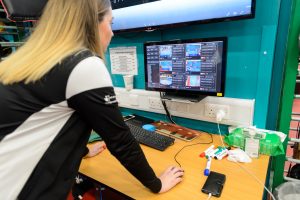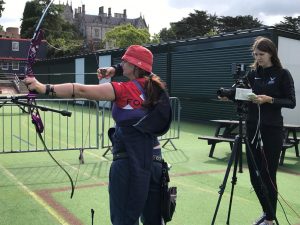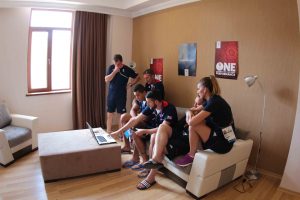EIS Code School
With so many developments in technology, sport scientists have access to more data than ever before. This provides the opportunity to investigate many performance questions, but also increases the need for data handling skills and to be able to process data efficiently and find the answers to those questions.
National Coding Week started on Monday 13th September 2021 and aims to build people’s digital skills and confidence. Coding is essentially giving a computer a set of instructions and allows us to process data in complex ways quickly and to reduce or remove time-consuming manual steps.

In 2020, the English Institute of Sport (EIS)’s Performance Analysis team recruited their first technical lead responsible for developing the use of coding in the EIS, Dr Cat Shin.
While there are many courses online, most are aimed at business users and do not use sport data. To create structured and supported learning, Dr Shin came up with the concept of EIS Code School, which aims to help practitioners across the EIS feel more comfortable with using coding as part of their day-to-day jobs. Bespoke, sports data focussed challenges were created with external consultant Dan St Paul, which aimed to recreate in code, specific manual tasks regularly conducted by practitioners.
Dr Cat Shin explained: “At the EIS, we aim to continually stay ahead of the curve and ensure our practitioners are confident using a wide range of skills and techniques to help high performance sports and athletes excel.
“Coding has a steep learning curve and is not a quick fix for a single question, but creates the scope to answer a given question and then continue to investigate data in more depth. This is true for any single discipline, for example performance analysis, biomechanics or physiology, but also particularly useful when it comes to combining data from the multi-disciplinary teams that exist in high performance sport.
“I’ve been delighted with the interest from a wide range of our practitioners in EIS Code School. Our second cohort will be finishing shortly, with many more wanting to get started.”

To enrol on EIS Code School, practitioners submitted an application outlining a potential project and a commitment to spending three hours per week dedicated to learning, which had to be supported by their Technical Lead and Line Manager within the sport they work at.
Dr Julia Wells, Head of Performance Analysis at the EIS, added: “Performance analysis is continually evolving, and we need to ensure we continue to have impact tomorrow. EIS Code School supports practitioners with data-focussed roles, to continue to draw insight from ever more complex data.”
A group of seven practitioners were successful in their application for the first cohort and would complete the course together, creating a community network to call on for the duration of the school and beyond.
One-to-one mentoring with Dr Shin or Dan St Paul, small group projects and peer reviewing challenges all led up to a final project which would have direct impact on the sport they worked with.

Each practitioner worked on their own projects from recreating reports which had previously taken hours, to advanced statistical testing to gain new insight, to developing an app to explore data, the first cohort of code school went above and beyond what was expected or hoped.
The first cohort included Amber Luzar (GB Hockey), Ander Rodoreda (GB Hockey), Anna Knowles (previously Archery GB, now Boccia UK), Chris Connelly (GB Boxing), Debs Sides (British Cycling) and Jess Smith (GB Boxing).
Ander Rodoreda, hockey, said: “Learning to code with the EIS Code School opened my eyes to what was possible and the power behind coding and I see it as an essential skill to develop for future analysts.”
Jess Smith, boxing, said: “We were always a bit worried about the time it would take to learn to code. However with relative small investment we managed to create a lot more work time by automating long data processes.”
Anna Knowles, formerly archery, now boccia, said: “The big gain for me was that processing time, from data capture to data vis, which was taking forever, has been shortened by a day for every capture session. Feeding back with coaches and athletes, I had more time to look at the information in detail and was able to really confidently share the key messaging.”
Amber Luzar, hockey, said: “The biggest lesson that learning to code taught me is that programming isn’t about what you know, it’s about what you can figure out. It teaches you how to problem solve in a logical manner and ask the correct questions to find the solution you need. Anything is possible, you just have to be open to try a new way of thinking.”
Debs Sides, cycling, added: “I by no means have the fanciest looking project, but it is definitely going to save me hours of my life so that’s a win win!”
The second cohort has expanded to include physiology, as well as performance analysts and biomechanists, and includes Alex Anastasiou (physiologist, British Sailing), Emma Bird (Performance Analyst, British Climbing), Holly Stock (Performance Analyst/Biomechanist, British Gymnastics), Kristen Wright (Performance Analyst, British Canoeing), Sophie Ball (Performance Analyst, British Cycling).